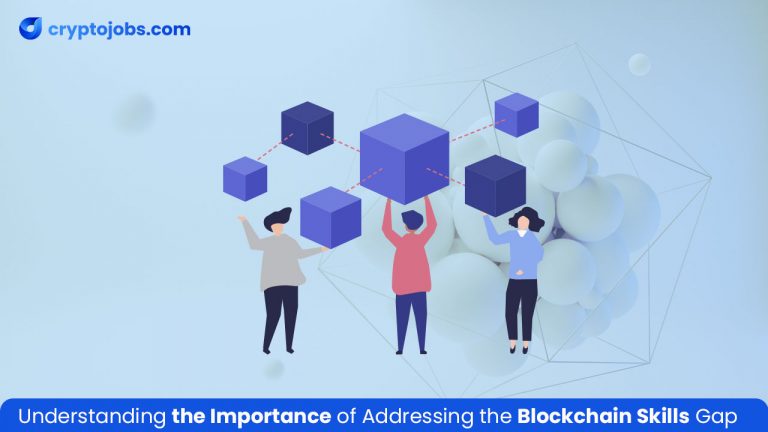
Understanding the Importance of Addressing the Blockchain Skills Gap
- cryptojobs.com
- January 23, 2024
- All Posts, Blockchain
- Blockchain Job
- 0 Comments
Blockchain is a dynamic and fast-growing industry that presents both opportunities and challenges for professional growth. The technology is quickly gaining trust among the general public with its improved security, transparency, and traceability of shared data. Plus, it also lowers costs with improved speed and efficiency.
However, the exponential growth of the industry, along with its unique and specialized aspects, has resulted in a talent shortage. The blockchain skills gap is a significant concern because there just aren’t enough skilled blockchain professionals. Since the technology is still in its infancy, it is essential that developers maintain, assess, and improve their blockchain skills to keep up with its evolution.
Addressing this issue is essential because, besides the obvious shortage of skilled professionals, rapid growth means a steep learning curve for professionals aspiring to enter this innovative field. Bridging this skills gap is not only essential for individual career growth, but it is also crucial for sustaining advancement and wider blockchain integration across different sectors.
Current State of the Blockchain Skills Gap
Marked by a pronounced scarcity of talented professionals, the current state of the blockchain skills gap is serious. As the demand for experts trained in navigating the intricacies of blockchain technology is accelerating, the shortage of skilled blockchain developers becomes more apparent. This difference in demand and supply is not only hindering the pace of blockchain integration but is also preventing the realization of its actual transformative potential.
Implications for Businesses and Organizations
The blockchain skills gap is shaping the trajectory of technological innovation and competitive positioning for businesses and organizations. Companies are struggling to recruit professionals with a nuanced understanding of blockchain aspects, including distributed ledger technologies, smart contracts, and decentralized applications. Without a proficient workforce, organizations may find themselves unable to fully leverage the benefits of blockchain. This, in turn, can potentially hinder the efficiency, security, and innovation of the technology.
Factors Contributing to the Blockchain Skills Gap
The blockchain skills gap is a challenge influenced by various factors. The most prominent ones include:
Rapid Technological Growth
Blockchain technology is rapidly evolving, with new concepts and frameworks being introduced frequently. To keep up with these changes, professionals working in the blockchain industry have to adopt continuous learning to stay up to date. This also poses a challenge for educational institutions because they, too, have to update their education material accordingly.
Limited Educational Programs
Given its innovative nature and continuous advancements, it is hard for educational institutions to offer a comprehensive blockchain-centered program. This shortage of specialized degrees, certifications, and courses prevents graduates from acquiring requisite skills, further increasing the blockchain skills gap.
Perceived Complexity
Blockchain technology is often perceived as complex and challenging to understand. This perception discourages potential professionals from entering the field, limiting the pool of skilled individuals.
Lack of Standardization
The absence of standardized skill requirements and certifications also makes it challenging for both employers and job seekers. Since the technology is still relatively new, there are no standards set against which professionals and recruiters can evaluate skills. A standardised framework could help in assessing and verifying blockchain skills, fostering a more transparent hiring process.
Cross-disciplinary Nature
Blockchain projects often require a combination of technical expertise and industry-specific knowledge. A typical blockchain team comprises blockchain developers, smart contract developers, blockchain architects, business analysts, legal experts, and UX/UI designers, to name a few. The cross-disciplinary nature of these roles makes it challenging to find individuals who possess both technical and domain-specific skills.
The Role of Education and Training Programs
The educational and training programs can address the blockchain skills gaps by providing interested individuals with the knowledge and expertise required to prosper in this field. They serve as bridges between theoretical understanding and practical application, offering hands-on experiences in blockchain development, smart contract creation, and decentralized application design.
Many institutions today are incorporating blockchain courses into formal education and vocational training to produce a pipeline of skilled professionals ready to meet the industry’s demands. Moreover, specialized training programs, workshops, and certifications are also providing avenues for current professionals to upskill and stay abreast of the rapidly evolving space.
It is also essential to foster a continuous learning attitude at educational institutions as well as organizations to cultivate a workforce ready to navigate the complexities of this decentralized ecosystem.
Strategies for Talent Acquisition
In the competitive blockchain talent market, acquiring skilled professionals requires a strategic blend of proactive measures, such as:
- Leveraging specialized blockchain job platforms and networks to connect with potential candidates actively engaged in the industry.
- Tapping into existing blockchain communities and forums for direct access to individuals passionate about blockchain technology.
- Embracing global talent pools and offering remote work opportunities.
- Showcasing the unique benefits of working in the blockchain industry, such as its transformative impact and potential for innovation.
- Collaborating with educational institutions and participating in industry events to help attract top-tier talent.
- Offering competitive compensation packages to attract industry specialists.
The Role of Blockchain in Skill Verification
Being decentralized and transparent, blockchain technology offers a great solution to authenticate and verify expertise. A blockchain-based skills verification system provides a decentralized ledger where educational achievements, certifications, and work experience can be securely recorded.
Professionals can leverage it to secure their credentials in an immutable and tamper-resistant manner. This not only enhances the credibility of their skills but also streamlines the hiring process for employers. Addressing the blockchain skills gap is crucial for the continued growth and widespread adoption of this technology. The multifaceted nature of the factors contributing to this gap requires a concerted effort from educational institutions, key industry players, and policymakers. Only with collaborative effort can we bridge the divide between demand and supply and fortify the foundation for a more robust, innovative, and inclusive blockchain ecosystem.




